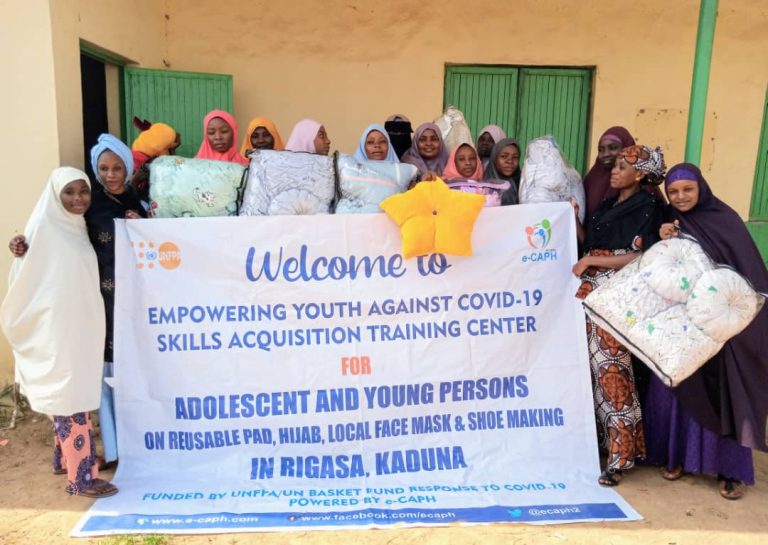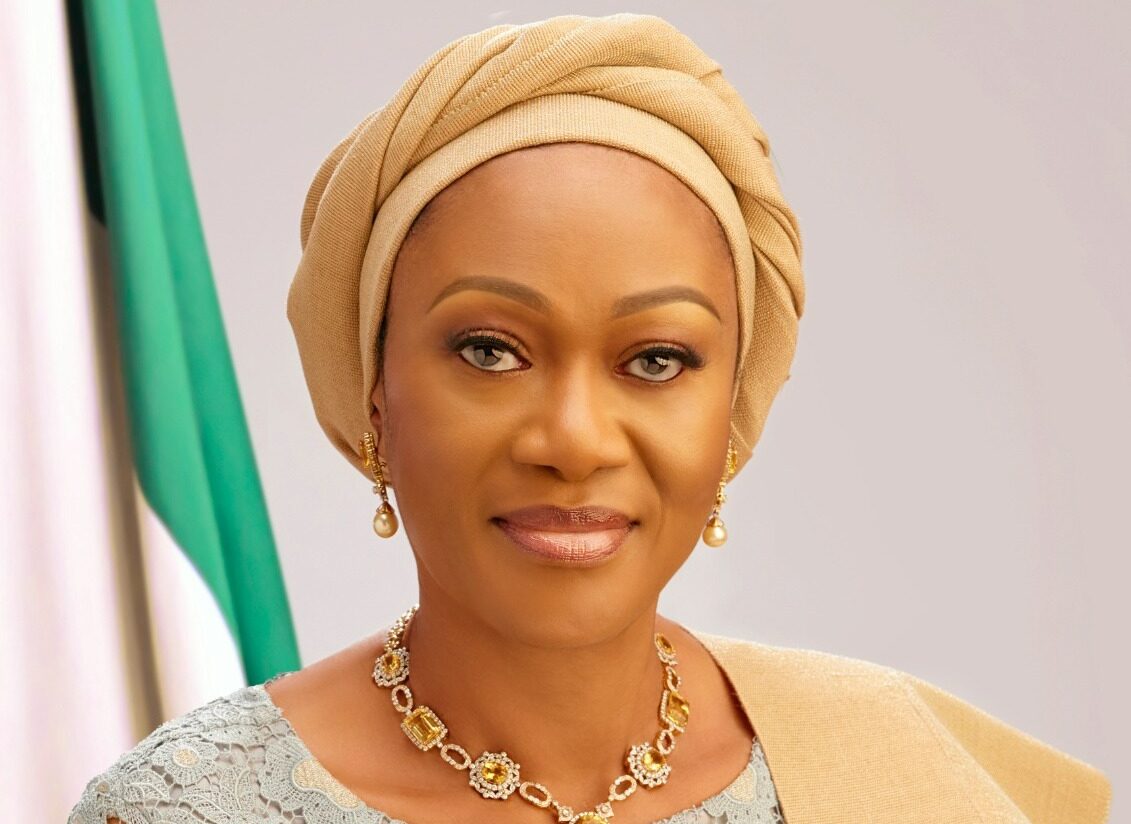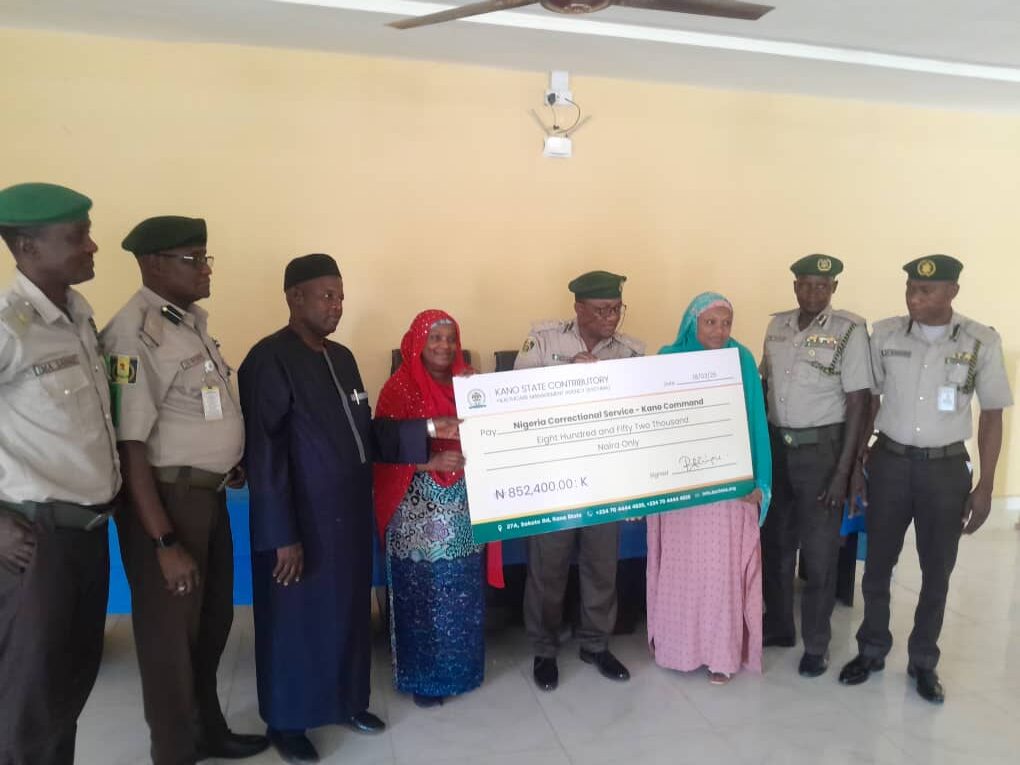Health
Menstrual hygiene solutions: Kaduna girls take action

Adolescent girls in Kaduna State, North-West Nigeria are currently behind the sale of over 15,000 packs of reusable menstrual hygiene products worth N3.5 million, in a scheme that has become not only a means of livelihood for communities, but has also improved quality of life for the users.
The difficulties girls go through to get sanitary pads can only be imagined, especially so in rural communities or slums.
One of such areas where this challenge manifests is Rigasa; is a densely populated urban slum in the south west of Igabi Local Government Area in Kaduna State.
Mr Yusha’u Abubakar, Founder and Executive Director, Enhancing Communities Action for Peace and Better Health Initiative, E-CAPH, said the issue of sanitary pads was a challenge in the community because of poverty and lack of economic empowerment.
“When the United Nations Population Fund (UNFPA) called for an application for a project to support adolescent girls and boys, we decided to apply with focus on this area because it is a challenge.
“We sent our proposal and UNFPA found it worthy and supported us to train young girls in our community.”
He said 200 girls were trained on making reusable sanitary pads, adding that the initiative has improved school attendance of girls in the community as well as taken care of their menstruation hygiene challenges.
Fatima Abdullahi, 18, is one those trained by E- CAPH and described the experience as overwhelming because she now produces it for her personal use and for trade.
“I was used to begging for money to buy pads or forced to use other materials in spite of its discomfort for my period. Now I help myself and others with my trade,” she said.
Similarly, Asma’u Mohammed, 18, said she was happy for the acquired skill that has made her self-reliant.
“With this, I don’t have to ask my parents for everything I need, because I can now earn little money by making sanitary pads for my peers.”
Sanitary pad boosting economic empowerment of the community
Albabatu Musa, Manager and Coordinator, E-CAPH Skills Acquisition Centre, said the accessibility of the reusable pad has made it a preferred choice for most girls in the Rigasa community.
“The reusable pad is made up of cotton-based materials because of its absorbable nature and easy access in the market.
So far, 15,000 packs of three pieces each, have been produced at the centre and sold for N3.5 million to a client in Borno State.
“At the open market, a pack is sold for N500 and for every pack, there is a gain (profit) of N150. The product is in high demand,” she said.
Musa said the pad was highly profitable and cost effective because it can be used for a minimum of 3 months and a maximum of 6 months.
“A pack of three go for N500 with a profit margin of N150. The trained adolescents were currently making the reusable pad for their personal use and sales.”
Support by UNFPA
Mariana Darboe, the Programme Coordinator and Head of Office, UNFPA Decentralised Office for Northern Nigeria, said the reusable sanitary pad project was part of the livelihood support training as a COVID-19 response to alleviate poverty in communities.
She said the project was supported by the funds Risk Communication and Community Engagement, RCCE, project under the UN Basket Fund support for COVID-19 response in Nigeria.
Ms Darboe added that the RCCE initiative was to curb the risk and impact of gender-based violence and interconnecting sexual and reproductive health consequences.
A mother’s burden lifted
A mother of four, Sadiya Ibrahim, said the reusable sanitary pad had reduced her stress “because most times during their menstrual period I am helpless to help my four girls with the needed money to buy sanitary pads.
“Sometimes they feel uncomfortable saying that they are on their period, so they just use available pieces of clothes to help themselves.
“Whenever they use clothes, they spend most of their time in the room because it makes them uncomfortable.”
How we got the buy-in of the communities considering the religious and cultural challenges.
In most communities in northern Nigeria, talking about reproductive health issues among women and young girls is considered a no-go area. E-CAPH executive director Abubakar said the initiative surmounted this major limitation and got the buy-in of the community through advocacy.
“We were able to make people understand what sexual and reproductive health issues are all about and the need for parents to talk to their children about sexual reproductive health issues.
“The religious and community leaders provided the platform for us to talk to young girls in Islamiyah schools, women groups gathered their children and invited us to talk to them.
“This strategy helped in increasing the acceptance of talking about the issues in communities where it is hitherto difficult to do so.”
How the girls monthly dilemma turns to joy
Some users of the sanitary pads narrated their experiences on how it changed their monthly dilemma to joy.
Kadijah Salis, 17: “I use pieces of clothes due to lack of money to buy a pad. Sometimes I am forced to stay at home to avoid embarrassment in school because most times the clothes leak and stain our uniforms.
“The reusable pad is the best thing that has happened to some of us from poor households.
Sadiya Aliyu, 18, said she only got to hear of the reusable pad recently, adding that it is “better because I can use it for six months and it is very comfortable. I only need two for a whole year”.
The way forward for menstruation hygiene in Rigasa
The Founder and Executive Director of E-CAPH said that the initiative was able to overcome the challenges of non-acceptance by the community that was religiously inclined not to discuss matter relating to women and especially women monthly menstrual cycle.
This, he said, was due to the various trainings personnel of his organisation went through.
From these training “we were able to understand the role of religious leaders, community leaders, women and youth groups in advocating for reproductive health and family planning.
“There was equally a book produced by NUHRI on religious (Islamic and Christian) perspectives to family planning.
“We used the book in partnership with religious leaders and women groups to advocate for the acceptance of the family planning and reproductive health issues in communities.
“We were able to help them understand more about sexual and reproductive health issues. This led to the acceptance by parents to talk to their children and wards about sexual reproductive health issues.
Abubakar said that with the achievement so far recorded in helping the girls to better manage their menstrual hygiene, development partners, state government and local government areas should support the initiative to increase access by the poor and vulnerable adolescent girls in urban and rural areas.
NAN
Health
First Lady directs establishment of PHC in Sauka FCT to combat TB

The First Lady of Nigeria, Mrs Oluremi Tinubu, has directed Dr Adedolapo Fasawe, Mandate Secretary of the FCT Health Services and Environment Secretariat, to oversee the establishment of a Primary Healthcare Centre in Sauka, FCT.
A statement issued by the Special Adviser to the Secretary, Bola Ajao, on Wednesday highlighted that the initiative aimed to strengthen healthcare services in the region.
It also emphasised the goal of combating tuberculosis (TB), with support from FCT Minister, Mr Nyesom Wike.
According to the statement, Mrs Tinubu, who also serves as the Global and National Stop TB Champion, made the announcement at an event in Sauka, FCT, to commemorate World Tuberculosis Day 2025.
The event was organised by the Federal Ministry of Health in collaboration with the FCT Health Services Secretariat, Stop TB Partnership Nigeria, the World Health Organisation (WHO), and other partners.
During her speech, the First Lady emphasised the importance of grassroots interventions in the fight against TB.
She noted that the event themed, “Yes! We Can End TB: Commit, Invest, Deliver,” had been locally translated to “We Fit Run Am; A Collective Call for Action Against TB” to better resonate with the community.
“To support the fight against this communicable disease, I will not only donate N1 billion but also approve the establishment of a Primary Healthcare Centre in Sauka Community.
“This initiative aligns with President Tinubu’s Renewed Hope Agenda for an efficient healthcare system,” the First lady stated.
The First Lady added that Fasawe would oversee the project’s implementation with the backing of the dedicated FCT Minister, Wike.
She further explained that the new facility would serve as a critical hub for TB detection, treatment, and general healthcare services, ensuring that residents received timely and quality medical care.
In spite of TB being preventable and treatable, the First Lady pointed out that it remained a significant public health challenge in Nigeria, which ranked among the countries with the highest TB burden globally.
“This underscores the urgent need for improved healthcare services and stronger community-based interventions.”
In her response, Fasawe commended the First Lady for her unwavering dedication and strong support in the fight against TB elimination.
She also acknowledged the efforts of FCT healthcare workers, whose hard work had contributed to significant improvements in the health system.
“The establishment of the new Primary Healthcare Centre in Sauka is a significant step toward enhancing healthcare services, improving TB control, and ensuring accessible healthcare for all in the FCT,” Fasawe affirmed.
The event also featured an exhibition stand by the Public Health Department of the FCT, where attendees were provided with free TB testing.
Key stakeholders in attendance included Hajiya Nana Shettima, Wife of the Vice President; Members of the National Assembly; Dr Iziaq Salako, Minister of State for Health; and Mrs Adekemi Nanpad, Comptroller General of the Nigeria Immigration Service.
Also present were wives of the Federal Executive Council members, Dr Walter Kazadi Mulombo, WHO Country Representative, and many others.
Health
Kano Govt pledges quality healthcare in custodial centres

The Kano State Government has pledged its commitment to quality healthcare services for inmates in custodial centres across the state.
The Executive Secretary of the Kano State Contributory Healthcare Management Agency (KSCHMA), Dr Rahila Aliyu-Mukhtar, made the pledge while presenting the allocation of a monthly capitation of N852, 400 to support medical services for inmates in custodial centres.
She lauded Gov. Abba Kabir-Yusuf, for supporting vulnerable individuals and prioritising healthcare for inmates.
The executive secretary also commended the Kano command of the Nigerian Correctional Service for its support and cooperation.
She commended Kano for being one of the first states to enrol inmates in a structured healthcare scheme.
Responding, the Controller of Corrections, Kano State Command, Ado Inuwa expressed appreciation to the state government for its unwavering support in the enrollment of inmates under the healthcare services scheme.
He assured that the allocated funds would be utilised judiciously to cover essential medical treatments and emergency care for inmates.
Inuwa lauded Aliyu-Mukhtar for her zeal, determination and commitment to humanity, particularly in ensuring that inmates have access to healthcare services.
NAN reports that on Dec. 31, 2024, the state government approved the enrolment of inmates in custodial facilities into the State’s Health Contributory Scheme, ensuring they now enjoy health insurance coverage.The scheme provides inmates with access to basic and comprehensive healthcare services while in custody.
Headlines
NAFDAC strengthens regulations to combat antimicrobial resistance in Nigeria

The National Agency for Food and Drug Administration and Control (NAFDAC) has intensified its efforts to combat Antimicrobial Resistance (AMR) in Nigeria by implementing stricter regulations and surveillance measures.
Dr Tunde Sigbeku, Deputy Director and AMR-OH Focal Person at NAFDAC, said this on Thursday in Lagos.
Sigbeku spoke during a five-day training session for journalists, civil society organisations (CSOs) and community-based organisations (CBOs) focused on AMR.
The News Agency of Nigeria (NAN), reports that the training was organised by the Fleming Fund Country Grant (FFCG II).
The project is supported by the UK Government’s Foreign, Commonwealth and Development Office (FCDO).
Sigbeku highlighted the dangers of AMR, emphasising that it poses a severe threat to human, animal, and environmental health.
He said that NAFDAC had implemented several policies, including banning the use of antibiotics as growth promoters in livestock and fish production.
“AMR is real and with us in Nigeria. We have cases in hospitals, including babies born with colistin resistance, and it is also present on farms.
“We are taking steps like prohibiting the sale of branded medicated feed in open markets.
We are also restricting the use of certain veterinary drugs in food-producing animals, such as Carbadox, Nitrofural, and Olaquindox.
“We are strengthening port inspections to detect substandard and falsified antibiotics using advanced technologies like TRUSCAN and the Mobile Authentication Service (MAS),” he said l.
According to him, recognising that AMR requires a multi-sectoral approach.
He said that the agency had established collaborations with international and national stakeholders.
He listed such stakeholders to include the World Health Organisation (WHO), the Food and Agriculture Organisation (FAO), and the Fleming Fund.
“NAFDAC is also monitoring the importation and use of human and veterinary antibiotics to ensure compliance with national regulations,” he said.
Sigbeku stressed the need for continuous public awareness and collaboration with research institutions.
“We must educate, advocate, and act now.
“Increased surveillance, research, and policy enforcement are crucial to preventing a post-antibiotic era where common infections become deadly,” he said.
As Nigeria joins the global fight against AMR, he urged healthcare providers, farmers, and the general public to use antibiotics responsibly to preserve their effectiveness for future generations.
NAN recalls that the FFCG II has been instrumental in Nigeria’s fight against AMR.
Managed by Management Sciences for Health (MSH), the project collaborates with the One Health Ministries.
They are the Federal Ministry of Health and the Federal Ministry of Agriculture and Food Security (FMAFS), as well as the Federal Ministry of Environment.
The aim is to implement a coordinated, multisectoral approach addressing AMR across human, animal, and environmental health.
Aligned with Nigeria’s FFCG Phase 2 Country Investment Strategy (CIS), the project focuses on four priority areas:
Producing quality AMR data, analysing data effectively, sharing analysis with decision-makers and promoting sustainable investment to counter AMR.
Through these efforts, the project plays a crucial role in strengthening Nigeria’s response to AMR, a growing public health concern.
-

 Headlines4 years ago
Headlines4 years agoFacebook, Instagram Temporarily Allow Posts on Ukraine War Calling for Violence Against Invading Russians or Putin’s Death
-

 Headlines4 years ago
Headlines4 years agoNigeria, Other West African Countries Facing Worst Food Crisis in 10 Years, Aid Groups Say
-

 Foreign3 years ago
Foreign3 years agoNew York Consulate installs machines for 10-year passport
-

 News1 year ago
News1 year agoZero Trust Architecture in a Remote World: Securing the New Normal
-

 Entertainment3 years ago
Entertainment3 years agoPhyna emerges winner of Big Brother Naija Season 7
-

 Headlines1 year ago
Headlines1 year agoNigeria Customs modernisation project to check extortion of traders
-

 Entertainment2 years ago
Entertainment2 years agoMovie download platform, Netnaija, announces closure
-

 Economy2 years ago
Economy2 years agoWe generated N30.2 bn revenue in three months – Kano NCS Comptroller







